
The first noticeable thing about Suresh Triveni's Jalsa is its striking poster. It has Vidya Balan, who plays Maya, with her mouth covered. It also has Shefali Shah, who plays Ruksana, with her eyes covered. These women are tied together by the strand of a hit-and-run accident that leaves Ruksana's daughter Alia (Kashish Rizwan) fighting for her life. This beautiful poster succinctly surmises the plot of the film. One does not speak the truth, and the other does not see the truth.

Jalsa is a film about mothers. And fathers. And children. Maya is a single mother who works as a journalist. She lives with her mother, Rukmini (Rohini Hattangadi), who helps her take care of her differently-abled son Ayush (Surya Kasibhatla). Ruksana, a mother of two, works as a cook at Maya's place. Since Ruksana and her husband have to work odd hours, she asks her neighbors to look after her daughter. The police inspector More (Shrikant Yadav) is preparing for his daughter's wedding, after which she will leave for Colorado. The journalist Rohini (Vidhatri Bandi) is looking for a new place to live so that her mother can come to stay with her. Raju (Trushant Ingle) puts up a billboard for 'Jalsa' on the birthday of his 'Daddy' Ramnik Bhai (Vijay Nakam). All these mothers, fathers, and children end up in sticky situations. And, to get out of those situations, they have to make difficult and often unethical choices.

In the first few moments, Jalsa reveals that Maya was driving the car that hit Alia and ran away after the incident. The film is not really about who did it or the ensuing investigation. It is about the choices, the morality, and the actions of its people. Maya, who is almost haughty in her pursuit of truth while questioning others, chooses to bury the truth when it comes to her own life. A person's ethics are tested when they stand by them even if they are not beneficial for them. The city has billboards with her photographs, asking 'what is truth.' Later, those billboards serve as a reminder to her of her own complicity in hiding the truth. Ruksana, whose daughter almost dies, tries to negotiate a settlement to get a considerable sum of money. Every person in the film attempts to look out for their own and makes the most of the opportunity. The police inspectors took a bribe and now want to negotiate a settlement to keep their name out of the investigation. Rohini agrees to remain quiet for a few lakhs to get the house she wants. Even Maya's driver asks for money from her as his price to fix her car after the accident.
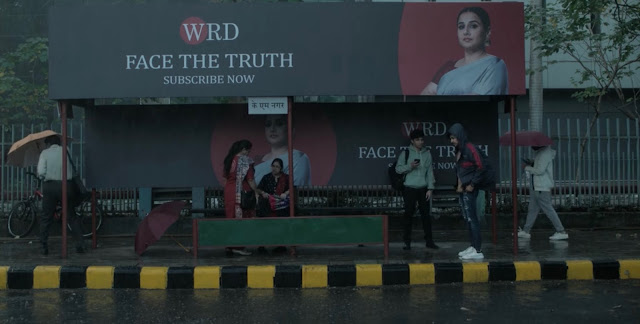
Suresh Triveni had earlier made the charming Tumhari Sulu. The repeating theme in Tumhari Sulu was that of women, especially working women. Initially, in the film's first few scenes, Sulu (Vidya Balan) watches a woman driving an Ola cab. Sulu's neighbors are two women working as air hostesses, whom she often greets when they come back from work. When Sulu is looking for a job, she goes to a gym where the caretaker is a pregnant woman. There were working women throughout the film. In Jalsa, the theme is that of kids. Young boys playing and talking are seen at different stages. Jalsa is also a more serious film than Tumhari Sulu. The characters and their situations have no easy answers. Does paying for Alia's treatment absolve Maya of the choice she made to drive away from the scene earlier? Is it acceptable to ask for money instead of justice as Ruksana did? There is a climate crisis going on, but another crisis is going on with the characters' conscience. After the accident, Maya tries to come out of the car to help Alia, and the camera pans to her, where she tries to remove her seatbelt but then decides to drive away. When she comes home, she hides her car with its cover as if trying to conceal her crime. Then, like Nimmi in Vishal Bhardwaj's Maqbool, she washes her hands thoroughly, trying to clean herself of the guilt. When Ruksana finds out the truth about Maya, she literally and metaphorically tastes blood. And after that, she also cleans her house.
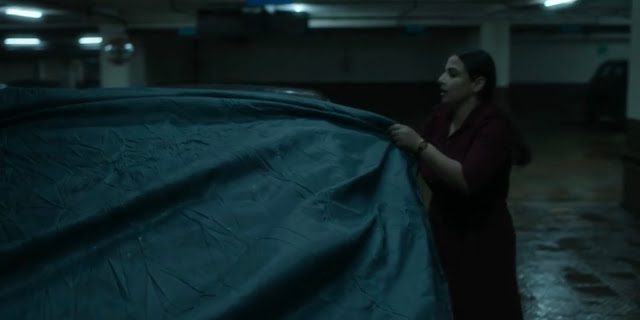

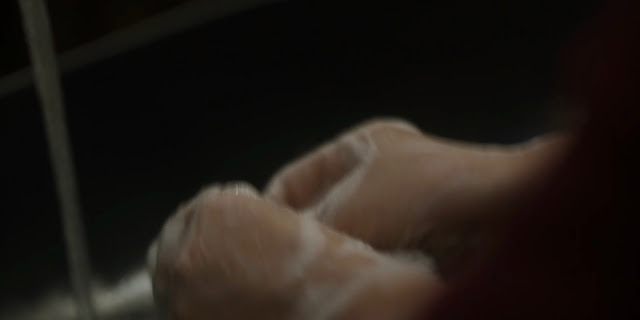

The other motif seen in Jalsa is the recording camera. Maya keeps a tab on her son's activities through a monitoring camera. In contrast, Ruksana does not have any device to know the whereabouts of her children. After the accident, Maya comes back to her house, and the CCTV records her act of covering her car. When Rohini finds the truth about Maya from the CCTV footage, she feels scared, and she walks all over the office, afraid that she is under surveillance. When she confronts More, he reveals the truth about the CCTV footage from the accident site. When he walks out of the restaurant, the CCTV captures him. There is a Parasite-style doorbell camera at Maya's house. It is as if someone is always watching these characters. Perhaps, as a sign that it is better to speak the truth and come clean.


Jalsa is also a film about class differences. When Ruksana's son comes along with her to Maya's house, he is excited by the automatic flush in the toilet. Bathrooms seem to be a favorite of filmmakers to depict class differences, as we have seen similar scenes in Zoya Akhtar's Gully Boy and Ramin Bahrani's The White Tiger. Maya visits a state-run hospital where Alia is admitted and transfers her to a private one. At the posh hospital, the cleaners and the housekeeping staff cast sly glances on Ruksana and her husband as if they do not belong there. The contrasts between the two hospitals are subtly made. They are visible but are not spelled out. Jalsa also depicts the milieu of Bombay with finesse. There are people from all walks of life. Ruksana's husband works as a spot boy in the film industry. Rohini has come from the south of India to work as a journalist. At one stage, Rizwan (Junaid Khan), who was with Alia on that fateful night, requests permission from his boss that he wants to go to 'Mulk,' where he is subtly referring to Bangladesh. There are other references to the film industry (such as Alia-Ranbir) and the changing social dynamics (such as the TikTok videos) where anyone can be an influencer these days. The colors of the film are also darker. There is almost no sunlight in the film, mirroring the state of its proceedings.
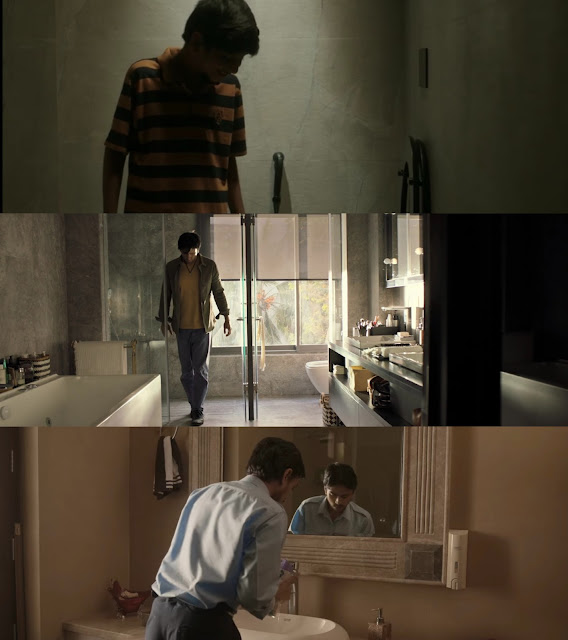
One of the most memorable things about Jalsa is its fantastic sound design by Anthony B Jayaruban. The film opens in the style of Ram Gopal Verma's Rangeela, where the sounds of the city of Bombay play when the opening credits roll on the screen. Jalsa then uses sound throughout its narrative to build up the tension beautifully. Early in the film, Amar (Iqbal Khan) questions Maya about her hard stance in an interview, but she increases the voice of the record player to drown out his voice. Towards the end of the film, Maya is trapped in her car and asking for help, but this time, the surrounding noise drowns out her voice. Maya scolds Ayush for his intransigence in another scene, but her voice is muted, and we don't get to hear her harsh words. Moments later, Rizwan tells Ruksana that he was with Alia on the night of her accident. Again, we don't get to hear his words, and his voice is muted. Whether it is the sounds of the car accident, the quietness of zoning out of Maya, or even the crumpling sound of paper, Jalsa uses silences and sounds carefully crafted, making its sound design one of the best things about the film.

Jalsa also boasts of powerful performances by its leading women. Vidya Balan and Shefali Shah are superb as Maya and Ruksana. I liked Ruksana more than Maya as her arc was more complex. All other cast members are great. It is lovely to see Rohini Hattangadi back in the movies, and I was looking at her filmography. She last acted in a Hindi film in 2013 when she played a role in Bejoy Nambiar's David. She is not that old, but somehow the characters she was given over the years aged her faster, just like Anupam Kher. Jalsa also has a beautiful performance by Surya Kasibhatla, who lives with cerebral palsy in real life.
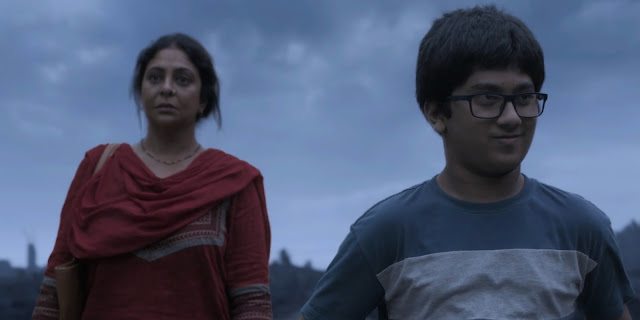
Jalsa establishes parallels between two mothers, Maya and Ruksana. Ayush had a special relationship with his Ruks. When Ruksana took Alia to the hospital, she remembered to ask Maya if Ayush had eaten his dinner. When Ruksana eventually finds out the truth about Maya being the car driver, it appears that she decides to take revenge. She takes Ayush to the beach, where he is left standing at a place where there is nowhere else left to go. She, however, does not take the final step. Because an eye for an eye makes the whole world blind. She could have left Ayush to drown, but she did not. She comes out as a bigger person in the end. At an earlier point in the film, Ayush and Ruksana laugh at the haanthi-cheenti jokes. The power dynamics are so imbalanced in favor of the elephant that any ant's action seems comical. But, sometimes, an ant too can exert a different kind of power by its choices. After all, as we saw in the case of Ruksana, power manifests not just physically but also morally.
Trivia:
1) A poster of Virat Kohli's quote is seen in Jalsa. "The bat is not a toy; it's a weapon. It gives me everything in life, which helps me to do everything on the field."

2) The charming uncle Sudha (Ajit Kelkar) from Tumhari Sulu also appears in Jalsa.
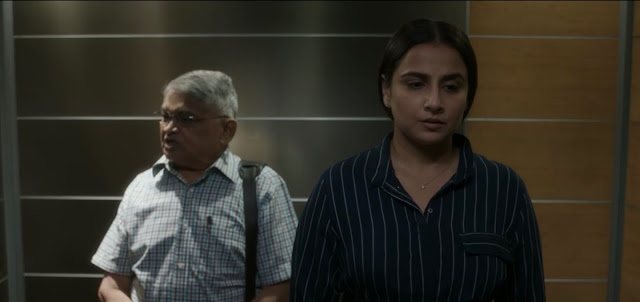




No comments:
Post a Comment
Post a comment